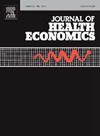The effects of Vietnam-era military service on the long-term health of veterans: A bounds analysis
IF 3.6
2区 经济学
Q1 ECONOMICS
引用次数: 0
Abstract
We analyze the short- and long-term effects of the U.S. Vietnam-era military service on veterans’ health outcomes using a restricted version of the National Health Interview Survey 1974–2013 and employing the draft lotteries as an instrumental variable. We conduct inference on the health effects of military service for individuals who comply with the draft-lotteries assignment (the “compliers”), as well as for those who volunteer for enlistment (the “always takers”). The causal analysis for volunteers, who represent over 70% of veterans, is novel in this literature that typically focuses on the compliers. Since the effect for volunteers is not point-identified, we employ sharp nonparametric bounds that rely on a mild mean weak monotonicity assumption. We examine a large array of health outcomes and behaviors, including mortality, up to 38 years after the end of the Vietnam War. We do not find consistent statistical evidence of detrimental health effects on compliers, in line with prior literature. For volunteers, however, we document that their estimated bounds show statistically significant detrimental health effects that appear around 10 years after the end of the conflict. As a group, veterans experience similar statistically significant detrimental health effects from military service. These findings have implications for policies regarding compensation and health care of veterans after service.
越战时期服兵役对退伍军人长期健康的影响:一个界限分析
我们使用1974-2013年全国健康访谈调查的限制版本,并采用选秀彩票作为工具变量,分析了美国越战时期服兵役对退伍军人健康结果的短期和长期影响。我们对服兵役对健康的影响进行了推断,对象是服从抽签草案分配的个人(“填表者”),以及那些自愿入伍的人(“总是填表者”)。对志愿者(占退伍军人总数的70%以上)的因果分析,在这一通常关注编译者的文献中是新颖的。由于志愿者的效果不是点识别的,我们采用了依赖于温和的平均弱单调性假设的尖锐非参数边界。我们研究了越南战争结束后长达38年的一系列健康结果和行为,包括死亡率。与先前的文献一致,我们没有发现对编译者有害健康影响的一致统计证据。然而,对于志愿者,我们的文件表明,他们的估计界限显示,在冲突结束后10年左右出现统计上显著的有害健康影响。作为一个群体,退伍军人在服兵役期间经历了类似的统计上显著的有害健康影响。这些发现对退伍军人服务后的补偿和医疗保健政策具有启示意义。
本文章由计算机程序翻译,如有差异,请以英文原文为准。
求助全文
约1分钟内获得全文
求助全文
来源期刊

Journal of Health Economics
医学-卫生保健
CiteScore
6.10
自引率
2.90%
发文量
96
审稿时长
49 days
期刊介绍:
This journal seeks articles related to the economics of health and medical care. Its scope will include the following topics:
Production and supply of health services;
Demand and utilization of health services;
Financing of health services;
Determinants of health, including investments in health and risky health behaviors;
Economic consequences of ill-health;
Behavioral models of demanders, suppliers and other health care agencies;
Evaluation of policy interventions that yield economic insights;
Efficiency and distributional aspects of health policy;
and such other topics as the Editors may deem appropriate.
 求助内容:
求助内容: 应助结果提醒方式:
应助结果提醒方式:


